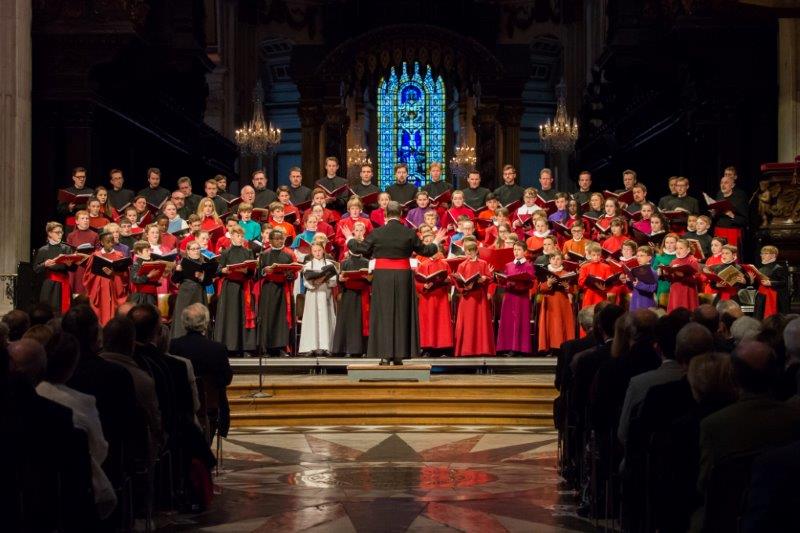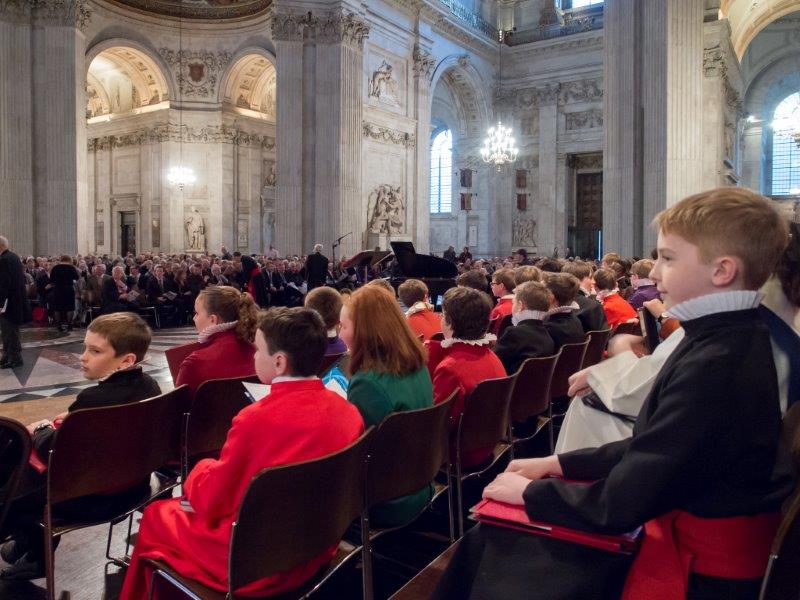Xander was a chorister at St Mary's Cathedral, Edinburgh and at Durham Cathedral, and at both Durham and then at Trinity College Cambridge was a choral scholar.
Here is the text of the excellent speech he gave
Your Royal Highness, my Lords, Ladies and Gentlemen: good evening! What a spectacular event this is and what a great honour it is to be a part of it. I am thrilled to be here. Moreover, I am delighted to have the opportunity to talk to you briefly about the tremendous privilege of choristership: the single greatest leg-up a child can be given in life.
Now, I know that sounds overblown and, yes, it is a bold claim but the more I think about it the truer I realise it is. Someone made the mistake of asking me during an interview the other day what the benefits are of being a chorister. Well that interview ended up overrunning by half of an hour and I was barely halfway through my list.
The most obvious benefit is the total submersion in music. This is a ‘compleat’ musical education by process of osmosis. When you come to hang up your cassock for the final time at the age of 13 you will – without even having realised it was happening because you were just having a lovely time singing – have personal experience of every age and fashion of music from the ancient fauxbourdons of plainchant, to the exciting knotty textures of anthems so contemporary that the composers themselves might very well have conducted you. You will have breathed life into everyone from Buxtehude to Britten to Bach to Bridge to Bax to Brahms to Byrd to Bairstow to Bruckner to Bliss (and that’s just the Bs I can think of off the top of my head). But you will know them, know them and love them in the way only a performer truly can. Choral music, to this day, has the power to move me so profoundly that I can lose myself in it for hours and just ride out the happy contemplations it evokes. It is a constant and lifelong tiding of comfort and – euphoric – joy.
Then there is the musicianship you absorb as a chorister, not just the music theory, the maths (the Italian!) all of which is very useful, but elegant musical phrasing, the projection of good diction, the shaping of beautiful vowel sounds for optimum tone, the careful precision singing a psalm, which can only be achieved by listening intently to those around you and blending your tone and rhythm with theirs – all of these skills and sensitivities become second nature and all of them have strange and unexpected use and resonance in later life.
And then there’s the language – and I don’t mean the salty badinage of the vestry but the liturgy you’re immersed in, the psalms, the collects, the canticles – the poetry you get to sing (Herbert, Donne, Milton, Shakespeare, Hardy, Auden are all poets I first learnt to love – Christopher Smart even – by singing and performing their words). Your lexicon at the age of 13 is astounding, and your turn of phrase, taught by endless psalms and hymns, and not just the range of your vocabulary but your innate sense of the poetic. You will have come to know only too well the powerful quiet of an evensong, the sumptuous echo of a final amen sung from an ante-chapel but rolling around the clerestory like wine in a taster’s glass.
And let’s not overlook the discipline of choristership; the order it brings to a young person’s often chaotic life, the friendship, the focus. Punctuality is one of the first lessons you learn: the ignominy of arriving even a minute late is something no chorister wants to experience twice. Then self-possession, decorum and grace are all attributes you quickly learn to fake – in the first instance – before adopting them for real as you gradually mature. But where else in the modern world is a child taught gravitas? Where else is a child taught, for example, to bow with proper dignity and humility?
I owe my entire career to my experience as a chorister. It was where I learnt to perform, where I learnt to use the full range of my voice; where I learnt to listen, where I learnt to write comedy, where I learnt to carry a pencil at all times – but most importantly it was where I learnt the wonderful truth that something exceptional, something as beautiful as anything anywhere, can be created just by you and your friends. I remember on a choir tour to Salamanca (ooh travel there’s another benefit!) exploring the old cathedral with a couple of friends and finding ourselves alone in some sort of chapter house, we fired off a Boyce 3-part canon just to test the acoustics. A terrible, toe-curlingly self-indulgent thing to do but what a sound we made! And what a thing to discover: that we three – children essentially – carried between us all the components of something so joyous, so perfect, so complete. (And Boyce! There we are, there’s another B for my list.)
I was lucky enough to be a chorister at St Mary’s Cathedral in Edinburgh which had a good mix of boy and girl choristers as is now fairly typical in cathedrals up and down the country. And both there and at Trinity College, Cambridge where I ended up as a choral scholar, I sang with people from all walks of life (many of whom had their entire educations – at some of the country’s best schools I might add – paid for by the music they had first learnt as choristers). I sang alongside some people of different faiths and plenty of none at all. And I am always heartened by the ethnic diversity in our cathedral and college choir rooms.
So you see, you don’t need to be a boy to be a chorister, you don’t need to be a toff to be a chorister, you don’t need to be religious, you don’t even need to be Christian. Although as I say that I’m aware there is a certain spirituality that all choristers come to know well – something that lurks in the silences of a darkening nave while rush-hour traffic chugs about just yards outside the West door. A spirituality that is wrapped up in the ritual, the mystery and the beauty of this ancient tradition we have become part of. And I’m going to call that spirituality The Privilege of Choristership. That is what we are here tonight to celebrate and to preserve for the future, ‘throughout all generations’.



No comments:
Post a Comment